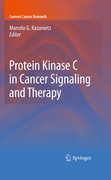
Protein kinase C (PKC), a family of serine-threonine kinases, rocketed to theforefront of the cancer research field in the early 1980’s with its identification as an effector of phorbol esters, natural products with tumor promoting activity. Phorbol esters had long been of interest to the cancer research field due to early studies in the mouse skin carcinogenesis model, which showed that prolonged topical application of phorbol esters promoted the formation of skin tumors on mice previously treated with mutagenic agents. Research in the last years has established key roles for PKC isozymes in the control of cell proliferation, migration, adhesion, and malignant transformation. In addition, there is a large body of evidence linking PKC to invasion and cancer cell metastasis. Moreover, it is now well established that the expression of PKC isozymes is altered in various types of cancers. More importantly, small molecule inhibitors have been developed with significant anti-cancer activity. The relevance of PKC isozymes in cancer signaling is therefore remarkable. This book willhave 4 sections. There will be 23 chapters. Each section will have a brief introduction by an expert in the field (~ 1-2 pages). Focuses specifically on PKC signaling at a mechanistic level in the context of cancer The first to present in a very detailed manner the implication of PKC isozymes in different types of cancers There will be a full section on anticancer agents that target PKCand on how PKC modulates the sensitivity of cancer cells to chemotherapeutic drugs INDICE: Protein Kinase C in Cancer Signaling and Therapy, Introduction andHistorical Perspective.- Regulation of conventional and novel protein kinase C isozymes by phosphorylation and lipids.- Phorbol esters and diacylglycerol: the PKC activators.- Diacylglycerol signaling: the C1 domain, generation of DAG and termination of signals.- Regulation of PKC by protein-protein interactions in cancer.- Introduction: PKC isozymes in the control of cell function.- Regulation and function of protein kinase D signaling.- PKC and control of the cell cycle.- PKC and the control of apoptosis.- Atypical PKCs, NF-kB and inflammation.- Introduction, PKC isozymes in cancer.- PKC, p53, and DNA damage.- PKCs as mediators of the Hedgehog and Wnt pathways.- PKC-PKD interplay in cancer.- Transgenic mouse models to investigate functional specificity of protein kinase C isoforms in the development of squamous cell carcinoma, a non-melanoma human skin cancer.- PKC isozymes and skin cancer.- PKC isozymes and breast cancer.- PKC and prostate cancer.- PKC and lung cancer.- Introduction, PKC isozymes as targets for cancer therapy.- PKC and resistance to chemotherapeutic agents.- PKCd as a target for chemotherapeutic drugs.- Atypical PKCs as targets forcancer therapy.
- ISBN: 978-1-60761-542-2
- Editorial: Humana
- Encuadernacion: Cartoné
- Páginas: 494
- Fecha Publicación: 01/01/2010
- Nº Volúmenes: 1
- Idioma: Inglés
